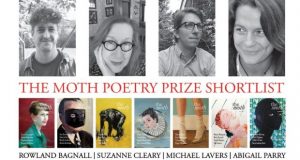Our final poetry news round-up of the week look at this year”s Moth Poetry Prize shortlist and the discovery of a previously unseen letter from a poet.
Moth Poetry Prize Shortlist Announced
 The shortlist for this year”s Moth Poetry Prize has been announced by the current chair of the creative writing centre at the Seamus Heaney Centre. Nick Laird stated that the list not only included a writer who had previously won the prize, but also a poet who had received a previous commendation for a poem.
The shortlist for this year”s Moth Poetry Prize has been announced by the current chair of the creative writing centre at the Seamus Heaney Centre. Nick Laird stated that the list not only included a writer who had previously won the prize, but also a poet who had received a previous commendation for a poem.
This year, the publishers of The Moth magazine, the sponsors of this international prize, have extended the cash fund that is available in order to be able to offer an additional eight prizes, each of which will be worth €250. These will be given to poets who have been commended for their work. There will also be a prize of €6000 for the winning poet and a further €1000 for each of the poets who have been shortlisted.
Laird has judged the poems for the shortlist blind, and those who have made it to the list include two poets from the US and two from Britain. The poems written by commended poets come from a wide range of countries including Italy, Australia, New Zealand and Ireland.
The following poems have made the shortlist. Rowland Bagnall’s “A Week in March”, Suzannne Cleary’s “For the Poet Who Writes to Me While Standing in Line at CVS, Waiting for his Mother’s Prescription”, “Chaos Soliloquy” by Michael Lavers and Abigail Parry’s “In the dream of the cold restaurant”. Parry is a previous winner of the prize, having won in 2016 when the judge was Billy Collins.
Letter From 17th Century Poet Uncovered
 The director of the School of Humanities at Penn State has discovered a letter whilst pouring through the archives. The letter, written in 1620 by the well-known English poet George Herbert, has been found at the University of Cambridge.
The director of the School of Humanities at Penn State has discovered a letter whilst pouring through the archives. The letter, written in 1620 by the well-known English poet George Herbert, has been found at the University of Cambridge.
Whilst the letter is rather brief and formal, Beck says that it offers an interesting look at the life of the poet. The first biography on the poet was. in fact, written in the 17th century but this letter clearly shows there is plenty more to learn about him, and this letter may have implications for those biographies already written.
In the letter, the registrar of the university is asked to consider Edward Parrat as a Scholar’s servant to the poet and also to name him as a person of privilege. A person of privilege was an individual who was not tried by a borough or church court but by the university court, they were also exempt from paying borough taxes.
What the letter clearly shows is that Herbert’s time as an orator at Cambridge was longer than his biographers have previously indicated. It also clearly hints at issues over money.
Beck is now hoping that the archive will reveal a lot more secrets about the poet, who was a friend to John Donne.


You must register to comment. Log in or Register.